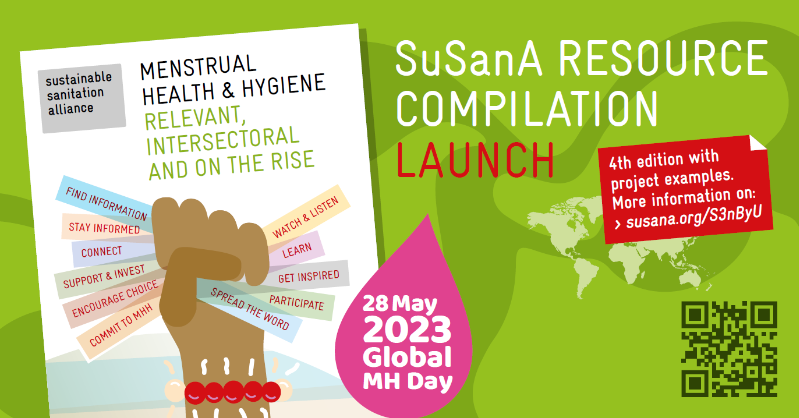- Forum
- categories
- Equity, inclusion and sanitation workers
- Menstrual health and hygiene (MHH) or Menstrual hygiene management (MHM)
- Menstrual hygiene products (e.g. menstrual cups, washable pads, period panties)
- Encourage Choice: Affordability and Sustainability
- Introduction to Encourage Choice: Affordability and Sustainability
Introduction to Encourage Choice: Affordability and Sustainability
1621 views
- secretariat
-
 Topic Author
Topic Author- Moderator
- SuSanA secretariat currently allocates 2 full time person equivalents of time from members of GIZ Sustainable Sanitation Team: Arne Panesar, Alexandra Dubois, Maren Heuvels, Teresa Häberlein, Daphne Manolakos and Bettina-Sophie Heinz.
Introduction to Encourage Choice: Affordability and Sustainability
Everyone should have the power to choose the menstrual product that best suits their needs, but this choice should not come at the cost of affordability or sustainability. Raising awareness, improving accessibility and ensuring affordability are all critical goals. While reusable pads, menstrual cups, biodegradable pads, period panties and some tampons are more sustainable options than traditional disposable menstrual products, it is important to acknowledge that not all of these options may be accessible, affordable or culturally acceptable to everyone.
Cultural or religious barriers may prevent people from using certain products, while others
may lack the financial resources to invest in more expensive, reusable products. What is more, some people may prefer the convenience of disposable products, even if they are not as sustainable. It is therefore essential to promote and encourage sustainable menstrual product choices while also recognizing and addressing the systemic barriers that may prevent some individuals from making these choices.
Moreover, it is crucial to acknowledge that individual consumer choices alone cannot solve the larger environmental issues surrounding menstrual waste. Governments and corporations must also take responsibility by implementing policies that promote sustainability and reduce waste in the menstrual product industry. Empowering individuals by providing accessible, affordable and sustainable options — and creating policies that support these choices — will ensure that the world is a more equitable and environmentally-conscious place for everyone.
Read more about “Managing Menstruation”
👉 www.rhsupplies.org: bit.ly/3VuFV6g
Cultural or religious barriers may prevent people from using certain products, while others
may lack the financial resources to invest in more expensive, reusable products. What is more, some people may prefer the convenience of disposable products, even if they are not as sustainable. It is therefore essential to promote and encourage sustainable menstrual product choices while also recognizing and addressing the systemic barriers that may prevent some individuals from making these choices.
Moreover, it is crucial to acknowledge that individual consumer choices alone cannot solve the larger environmental issues surrounding menstrual waste. Governments and corporations must also take responsibility by implementing policies that promote sustainability and reduce waste in the menstrual product industry. Empowering individuals by providing accessible, affordable and sustainable options — and creating policies that support these choices — will ensure that the world is a more equitable and environmentally-conscious place for everyone.
Read more about “Managing Menstruation”
👉 www.rhsupplies.org: bit.ly/3VuFV6g
Posted by a member of the SuSanA secretariat held by the GIZ Sector Program Water Policy – Innovations for Resilience
Located at Deutsche Gesellschaft für Internationale Zusammenarbeit (GIZ) GmbH, Bonn, Germany
Follow us on facebook: www.facebook.com/susana.org, linkedin: www.linkedin.com/company/sustainable-sanitation-alliance-susana.
Located at Deutsche Gesellschaft für Internationale Zusammenarbeit (GIZ) GmbH, Bonn, Germany
Follow us on facebook: www.facebook.com/susana.org, linkedin: www.linkedin.com/company/sustainable-sanitation-alliance-susana.
Attachments:
Please Log in to join the conversation.
You need to login to reply
Share this thread:
- Forum
- categories
- Equity, inclusion and sanitation workers
- Menstrual health and hygiene (MHH) or Menstrual hygiene management (MHM)
- Menstrual hygiene products (e.g. menstrual cups, washable pads, period panties)
- Encourage Choice: Affordability and Sustainability
- Introduction to Encourage Choice: Affordability and Sustainability
Recently active users. Who else has been active?
Time to create page: 0.114 seconds








